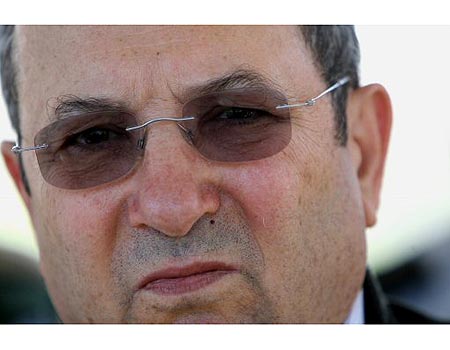"I hope he will go down what happened in Tunisia and Libya is very important, and even in Egypt, I hope it will end up being more smooth passing"
Israeli Defense Minister Ehud Barak said overnight Thursday he hopes Libyan leader Muammar Gaddafi's regime would fall, adding "the whole area is moving into a new chapter. Hopefully it will be better. We have to have strengths to protect ourselves while trying to find ways and openings for the political process and peace."
Speaking to CNN's Wolf Blitzer, Barak said, "I hope he will go down; what happened in Tunisia and Libya is very important, and even in Egypt, I hope it will end up being more smooth passing – not a kind of idealistic romanticism replaced by an Egyptian Robespierre or Lenin."
SYMPATHY TO MUBARAK
Addressing the ouster of Egyptian president Hosni Mubarak, the Israeli defense minister said, "I felt that the last page of an important chapter in the story of modern Egypt had ended, and a new one just started."I feel personally a lot of respect and sort of empathy to Mubarak. He was an important leader for his country," he said. Mubarak "was extremely committed to peace with us," Barak added. "I think that he deserves respect, and his dignity probably should be kept."
IRAN WARPLANES NOT WORRYING
Asked about the passage of two Iranian vessels through the Suez Canal earlier this week, he said, "I'm not worried. Your aircraft carriers are moving through the canal; our missile boats and submarines went through the canal; practically they (Egyptians) don't have any way to (prevent) the Iranians' (passage) as long as it’s a frigate and some support vessel with some cadets on it; it's a provocation, I don’t like it, but I don’t think any one of us should be worried.
"If they (Iranians) were bringing rockets or explosives or weapons to Hamas or Hezbollah we would have probably acted against them, but they (ships) are just coming – with weapons on them – but they are coming with navy cadets to visit a Syrian port; it's a way of projecting not power but self-confidence and certain assertiveness in the region," Barak said.
But Barak said Iran was "several years" from having the capability of putting a nuclear weapon on a medium-range missile. "It's clear they had certain holdups along the way and they are moving slower than expected," he told CNN.
"But the painful fact is they keep moving forward. They are overcoming gradually the difficulties they faced. They don't get tired of it," he said.
